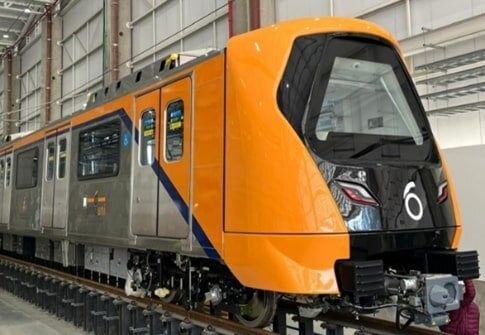Alstom delivers the first train for Line 6-Orange, in São Paulo
Made of stainless steel, the train will have the capacity to carry up to 2,044 passengers.
www.alstom.com

Alstom, a global leader in smart and sustainable mobility, has delivered the first train for Line 6-Orange. It belongs of the fleet of 22 six-car trains produced at Alstom's manufacturing site located in Taubaté, in São Paulo state. Each train will have the capacity to carry up to 2,044 passengers and reach speeds of up to 90 km/h. The line is expected to transport around 633,000 passengers per day.
Manufactured from stainless steel and highlighted in orange to reinforce the line’s name and identity, the new trains are lighter compared with ones featuring carbon steel carbodys, consume less electricity, and feature a layout designed to offer a better passenger experience of travel. Another characteristic is durability: the train structures are designed for durability to last over 40 years.
The trains were engineered using Alstom’s Lab 4.0, a virtual reality lab that employs advanced technology to simulate a realistic train experience in a virtual environment, allowing for early technical adjustments. This process provides a detailed view of various aspects such as seat design, handrail height, safety items, and the positioning of the motor and other components.
“Alstom has been a leader in rail mobility in Brazil for 70 years, and this project is a testament to the fact that we’re continuing to invest and innovate in this vital market,” said Suely Sola, General Director of Alstom Brazil. “We are very proud to have Line 6-Orange in our portfolio. This project is a milestone in urban mobility in Latin America and reinforces our commitment to the State of São Paulo and Brazil. With 70 years of presence in the country, we remain dedicated to offering efficient, safe, and high-quality public transport solutions. The initiative also contributes to a more sustainable system and improves quality of life, especially for students who will use the line,” says Suely Sola.
"The arrival of the first train at Pátio Morro Grande gives us the certainty that Line 6 operations are ever closer to becoming a reality. It was another important milestone for the Project, for the Brasilândia neighborhood, and for the entire city of São Paulo. Mobility is advancing, and we are proud to be part of this historic moment," says Jaime Juraszek, CEO of Concessionária Linha Uni.
Nicknamed the “university line,” Line 6-Orange will connect at least seven higher education institutions in São Paulo city, as well as schools near Avenida Paulista. A 2022 study by the São Paulo State Government indicated that over 40% of trips on Line 6 will involve travel to or from these educational institutions. Most passengers are expected to be university-aged individuals between 18 and 24 years old.
Spanning 15 km and with 15 stations, São Paulo's Metro Line 6-Laranja will connect the Brasilândia neighborhood in the North Zone to São Joaquim Station in the city center, reducing the journey time to just 23 minutes, a journey that currently takes about an hour and a half by bus. The line is expected to carry approximately 630,000 passengers daily. The largest infrastructure project currently underway in Latin America, the project is a public-private partnership (PPP) between the São Paulo State Government and the Concessionaire Linha Universidade. The project is being executed by ACCIONA, currently generating over 10,000 jobs. Once completed, the line will be operated by the Concessionaire for 19 years.
Alstom Taubaté
Inaugurated in 2015, Alstom’s manufacturing site in Taubaté city is a center of excellence in stainless steel car production. It is strategically located in an industrial hub near two major highways (Dutra and Carvalho Pinto) and close to the Port of Santos, the largest port complex in Latin America.
The plant produced 27 Citadis trams for Rio de Janeiro’s LRT, manufactured in record time for the Summer Olympics in Brazil, showcasing Alstom’s agility, commitment, and customer focus. This was the second project in the world to feature a 100% catenary-free system. After completing the LRT contract, the factory also produced NS16 cars for the Santiago Metro in Chile.
In November 2022, Alstom inaugurated the expansion of the unit following a R$100 million investment as part of its growth strategy after signing six national and international contracts. Since then, over 170 trains (more than 940 cars) have been produced in Taubaté for cities including São Paulo (Brazil), Santiago (Chile), Taipei (Taiwan), and Bucharest (Romania), highlighting the facility’s global mobility project capabilities.
Alstom Brazil
Present in Brazil since 1955, Alstom has actively contributed to the country’s infrastructure and mobility development, promoting social progress and environmental respect. A leader in rail mobility in the Brazilian market, the company also has the largest installed signaling base in Latin America, with over 6,000 km of signaled lines and more than 2,000 onboard systems in operation.
Alstom promotes mobility through all rail transport product lines, delivered to major passenger operators in Brazil, including São Paulo (SP), Rio de Janeiro (RJ), Porto Alegre (RS), Fortaleza (CE), Recife (PE), and Brasília (DF). Rolling stock production and control and signaling systems, which ensure safe train operations, are also part of mobility projects in other Latin American countries and around the world, such as South Africa, Argentina, Colombia, Chile, Ecuador, the United States, Mexico, Panama, Peru, the Dominican Republic, Romania, and Taiwan.
www.alstom.com

